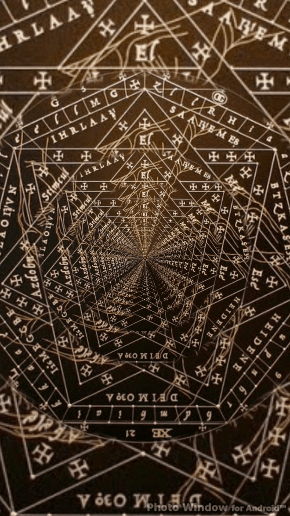According to the Hermetic Fellowship (1998) Hermeticism takes its name from the God Hermes Trismegistos or Thrice-Greatest Hermes. Trismegistos, in turn, was so-called because of His identification with the great Egyptian God of Wisdom and Magic, Thoth.
Thôth is a Greek attempt to phonetically render Tehuti, the late antique form of the very ancient Egyptian name Djehuti. In an effort to express Tehuti’s majesty, when writing His name Egyptian scribes would often append the epithet Ao, Ao, Ao (literally "Great, Great, Great," meaning "Greatest"). Greeks and Greek-speaking Egyptians translated the Egyptian epithet as Trismegistos, also using it for ‘their’ Thoth — Hermes.
Just
as Thoth was considered the all-wise font of sacred knowledge and author of all
sacred books in Egypt, so in the Greco-Roman world, and later, in Renaissance
Europe, Hermes Trismegistos was considered to be an unimpeachable authority on
things sacred and author of the influential body of literature known as the
Hermetica.
Hermetism
(the original Hermetic source from which the broader tradition of Hermeticism
derives) was one of the many products of the meeting of the ancient Hellenic
and Egyptian cultures in the centuries surrounding the beginning of the Common
Era. Hermetism, described most simply, combined Egyptian and Greek theology,
philosophy, and spiritual practice. But of course, it was not that simple.
 Perhaps
the principle reason the origin of Hermetism is complex is that it found its
most fertile home in the great syncretic Greco-Egyptian metropolis of
Alexandria, when that city was the cultural capital of the Mediterranean under
the Pax Romana. Religious and philosophical wisdom flowed from many cultures
into the city, the great spiritual Krater or Mixing Bowl which gave birth to
the new synthesis of religion, philosophy, and practice which was Hermetism.
Nominally Egyptian, and attributed to the Egyptian God Thoth in the guise of an
enlightened ancient master, the Hermetic elixir was composed of ingredients
from all the great Traditions active in Alexandria. To the millennia-rich stock
of Egyptian religion, philosophy, and magic were added many elements from Greek
Paganism (itself influenced throughout its development by Egypt, Anatolia,
Phoenicia, and Syria), particularly the Mysteries and the philosophical schools
of Platonism, Neo-Platonism, Stoicism, and Neo-Pythagorism; Alexandrian
Judaism, with its Angelology, Magic, and deep reverence for the sacred Book;
the many forms of Christianity (Gnostic and otherwise); Persian Zoroastrianism,
with its deep concern with good and evil; as well as the new developments springing
up alongside Hermetism and cross-fertilizing with it, such as Alchemy and
Iamblichan Theurgy.
Perhaps
the principle reason the origin of Hermetism is complex is that it found its
most fertile home in the great syncretic Greco-Egyptian metropolis of
Alexandria, when that city was the cultural capital of the Mediterranean under
the Pax Romana. Religious and philosophical wisdom flowed from many cultures
into the city, the great spiritual Krater or Mixing Bowl which gave birth to
the new synthesis of religion, philosophy, and practice which was Hermetism.
Nominally Egyptian, and attributed to the Egyptian God Thoth in the guise of an
enlightened ancient master, the Hermetic elixir was composed of ingredients
from all the great Traditions active in Alexandria. To the millennia-rich stock
of Egyptian religion, philosophy, and magic were added many elements from Greek
Paganism (itself influenced throughout its development by Egypt, Anatolia,
Phoenicia, and Syria), particularly the Mysteries and the philosophical schools
of Platonism, Neo-Platonism, Stoicism, and Neo-Pythagorism; Alexandrian
Judaism, with its Angelology, Magic, and deep reverence for the sacred Book;
the many forms of Christianity (Gnostic and otherwise); Persian Zoroastrianism,
with its deep concern with good and evil; as well as the new developments springing
up alongside Hermetism and cross-fertilizing with it, such as Alchemy and
Iamblichan Theurgy.
Modern
Hermeticism maintains this spiritual eclecticism, exploring and assimilating
what is compatible and valuable from the Traditions with which it comes into
contact, and sharing its own insights with other Traditions.

Comments
Post a Comment